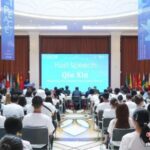The second “World China Studies Conference” will be held from October 13 to 15, 2025 at the Shanghai International Convention Center. The conference theme is “Historical China and Contemporary China from a Global Perspective,” bringing together nearly 500 Chinese and international experts and scholars for in-depth discussions and exchanges along the Huangpu River.
The conference includes five parallel sub-forums focusing on five major topics: “Viewing China from the World: Continuity and Innovation of Civilization,” “Theoretical Analysis and Practical Insights of Chinese Modernization,” “World China Studies Knowledge System from Multidisciplinary Perspectives,” “World China Studies in the Digital Intelligence Era: Opportunities and Challenges,” and “Youth and the Future of World China Studies.” These sessions will academically connect historical China with contemporary China, facilitate in-depth exchanges on the continuity and innovation of Chinese civilization, thoroughly discuss the civilizational connotations, practical insights, and global significance of China’s development path, aiming to reach broader consensus on China studies development at deeper levels, wider scopes, and greater extents, while continuously promoting exchanges and mutual learning among civilizations.
The conference will also release the World China Studies Development Initiative and introduce recommended reading lists for world China studies. The “From Civilized Cities to Urban Civilization” exhibition and “Shanghai Urban Culture and History Investigation” are important supporting activities for the conference.
World China Studies Conference
The World China Studies Conference is an international academic forum that brings together scholars worldwide to discuss research on China’s history, culture, and development. It serves as a platform for dialogue between Chinese and international sinologists, fostering global understanding of China’s civilization and contemporary transformation. The conference reflects China’s engagement with global scholarship while highlighting its historical continuity and modern achievements.
Shanghai International Convention Center
The Shanghai International Convention Center is a prominent waterfront venue located in the Lujiazui financial district, which opened in 1999. It is historically significant for hosting the 2001 APEC Economic Leaders’ Meeting, a major international summit that elevated Shanghai’s global profile. Today, it remains a key venue for high-level conferences, exhibitions, and corporate events in China.
Huangpu River
The Huangpu River is a 113-kilometer-long waterway flowing through Shanghai, dividing the city into its eastern Pudong and western Puxi districts. Historically, it served as a vital commercial artery and the heart of Shanghai’s development into a global trading port. Today, it is famous for its iconic skyline views, featuring landmarks like the Bund and the skyscrapers of Lujiazui.
Historical China
“Historical China” refers to the vast span of Chinese civilization, one of the world’s oldest continuous cultures with written records dating back over 3,500 years to the Shang Dynasty. It is defined by a succession of imperial dynasties, such as the Han and Tang, which developed foundational philosophies like Confucianism and produced monumental achievements including the Great Wall and the Terracotta Army. This long history established a profound cultural legacy that has deeply influenced art, governance, and society across East Asia.
Contemporary China
“Contemporary China” refers to the modern period of China following the economic reforms initiated in 1978, which marked a shift from a planned to a market-oriented economy. This era is defined by rapid urbanization, technological advancement, and global integration, transforming China into a major world economic and political power. Culturally, it is a dynamic landscape where ancient traditions coexist with modern, state-influenced art, media, and a fast-paced consumer society.
Chinese civilization
Chinese civilization is one of the world’s oldest continuous civilizations, with a recorded history spanning over 4,000 years. It originated in the Yellow River Valley and is renowned for profound philosophical traditions like Confucianism and Taoism, as well as pivotal ancient inventions such as paper, gunpowder, and the compass. This enduring cultural legacy has profoundly shaped the social structures, arts, and intellectual life of East Asia and beyond.
Chinese modernization
Chinese modernization refers to the development path pursued by China since the late 20th century, aiming to build a modern, powerful socialist society while preserving its cultural identity. This comprehensive process involves economic growth, technological advancement, and social progress under the leadership of the Communist Party of China. It represents an alternative to Western modernization models, emphasizing common prosperity and a community with a shared future for mankind.
World China Studies Development Initiative
The World China Studies Development Initiative is a contemporary academic program launched to promote international research on Chinese civilization and modern development. It fosters global scholarly exchange through conferences, publications, and collaborative projects between Chinese and international institutions. The initiative reflects China’s ongoing efforts to enhance global understanding of its cultural heritage and contemporary society.





